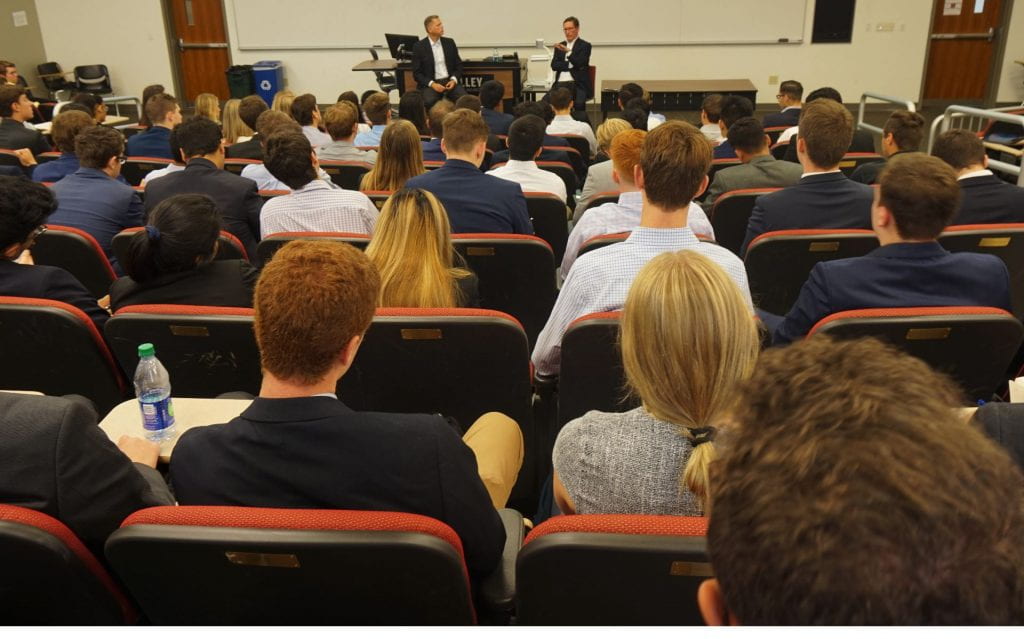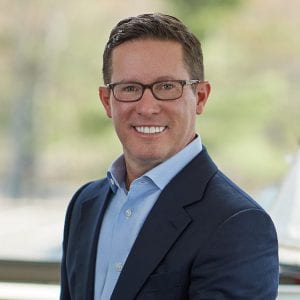
BLOOMINGTON, Ind. – Patrick Decker, president and CEO of international water technology company Xylem, returned to the Indiana University Kelley School of Business on Sept. 13 to speak to more than 150 students, providing them with insights into how he and other c-suite executives communicate with all areas of Wall Street.
Decker, who has led the 17,000 plus-employee company since 2014, also spoke about the importance of corporate social responsibility. At a time when there’s much debate about the importance of clean energy, Xylem is directing attention to “clean water.”
The company uses digital intelligence and analytics to help customers and communities manage water more effectively and be more environmentally sustainable. Among its clients worldwide is the city of South Bend, Indiana, where the company helped reduce sewer overflows by 70 percent and prevents more than 1 billion gallons of polluted water from entering local waterways annually.
As part of its efforts to create social value, Xylem is collaborating with environmental youth leadership organization EarthEcho International to host events nationwide highlighting the need for a clean water future. In mid-August, the company was again included on Fortune’s “Change the World” list of 50 companies that have made social impact a significant part of their core business strategy.
In the summer of 2018, the world watched as courageous cave divers, local responders and many other volunteers helped rescue members of a youth soccer team and their coach, who were trapped in a flooded cave in Chiang Rai, Thailand. In support of the Thai-led rescue effort, a team from Xylem helped reconfigure pumps to increase the flow rate of water being removed from the cave, improving the rescue team’s chances of success dramatically.
 “When you are in a position where you’ve got the capability to help, you do so,” said Decker, a 1987 Kelley graduate. “I know that sounds very ‘motherhood and apple pie,’ but it’s just true … I’m a big believer in karma and karma’s very simple – what goes around comes around. You do good things for the right reasons and good things happen to you over time.”
“When you are in a position where you’ve got the capability to help, you do so,” said Decker, a 1987 Kelley graduate. “I know that sounds very ‘motherhood and apple pie,’ but it’s just true … I’m a big believer in karma and karma’s very simple – what goes around comes around. You do good things for the right reasons and good things happen to you over time.”
After seeing what Xylem could do in Thailand, company employees asked if a humanitarian quick response team could be formed to provide aid after major disasters. (As part of its commercial business, Xylem provides disaster planning, response and recovery services.) Xylem was among one of the first water technology companies permitted to visit the Bahamas and assist in the recovery efforts, just days after the devastating Hurricane Dorian struck.
In the picture below, Xylem employees, together with Planet Water, quickly deployed water filtration tower projects and an AquaPod clean water system for use by the thousands of people living in relocation camps after a series of earthquakes struck the Indonesian island of Lombok.
“It takes a while for people to recognize what you’re doing and know that when you reach out during those times of disaster to offer humanitarian support, you’re legitimate and that you’re doing it for the right reasons, that you’re doing it because you have capability,” Decker said. “We’ve got a reference list that we can point to. Our aim now is that anytime there’s a water-related natural disaster, we want people to know that Xylem is there.”
Most of Decker’s presentation, “Interactions of Wall Street with the C-Suite,” focused on topics of specific interest to students in Kelley’s Investment Management Workshop.
Moderating the discussion was Dan Aron, a 1983 Kelley graduate, former partner with Levin Capital Strategies and member of the school’s Dean’s Advisory Council.
“Patrick covered a myriad of topics that hopefully helped the students understand what he and other chief executives expect from those in the research, asset management, investment banking, capital markets and in a private wealth manager,” Aron said. “It was great to see a broad spectrum of ages and professional interests in attendance.”
Before coming to Xylem, Decker was president and CEO at Harsco Corp., a global industrial services company. He also served in several leadership roles at Tyco International, including as president of Tyco Flow Control. He serves on the Bipartisan Policy Center’s Executive Council on Infrastructure, the Infrastructure Committee for the U.S. Business Roundtable, as well as the Dean’s Council at Kelley.
